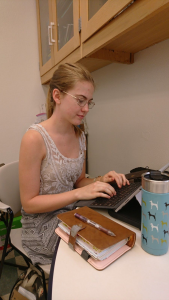
As a computer science student, I have faced constant pressure to find my next internship or career opportunity. Almost every day there is a company tabling in the GDC lobby or hosting a recruitment event somewhere. Computer Science majors are often in a world of their own, away from the rest of CNS, where they are encouraged to pursue an internship at one of the “Big 4” and to focus their studies on perfecting their programming skills. We often lose sight of how computer science can be used alongside other natural sciences to directly impact the most basic parts of people’s lives, including their health. I started in FRI in the Computational Intelligence and Design stream. In my first semester, I met many interesting and passionate people. That class was almost entirely computer science majors, and I was excited to talk about hill-climbing algorithms, neural networks, and how these could be used to train computers to make decisions. We had a lot of knowledge and projects, and our mentors were kind and knowledgeable and helped us make it through. At the end of the semester, I teamed up with some friends I made in that class to create an algorithm that makes predictions about emergency response calls. Although our results were not great, I learned a lot doing that project, and I was excited to
continue in FRI my sophomore year. When I found out the stream was discontinued, I knew immediately which stream I wanted to join: Quantum Computing, the cutting edge of computer science research! We were also told we could join DIY Diagnostics, but I blew that off. Biology was far from my favorite science, and the thought of it brought back memories of staying up all night trying to complete a Science Fair project. On one of the last days of the semester, Dr. Riedel came to speak to our class and tell us
why we should transfer into DIY Diagnostics next semester. I sat in the front row and prepared to let my eyes glaze over
while I smiled politely. Strangely, though, I found I was actually interested in what he was saying. His passion about
diagnostics was obvious, and I realized that the machine learning skills I had learned could actually make a big difference
in their research. There was also a certain appeal to being one of the most experienced programmers in the stream by
default.
After meeting with a DIY mentor, I decided to switch into DIY Diagnostics. It is definitely intimidating to be conducting
research in a field I know so little about, but I know my peers will be able to help me with my weaknesses, and vice versa.
This semester I hope I can contribute to the lab community and learn more about the fields of science that I have been less
than enthusiastic about in the past. I am planning to work on a project that uses typing patterns, such as how fast someone
types or how often they make mistakes, to detect Parkinson’s disease, a neurological condition that affects motor skills.
I’m looking forward to the challenges ahead and the friends who will help me along the way.
